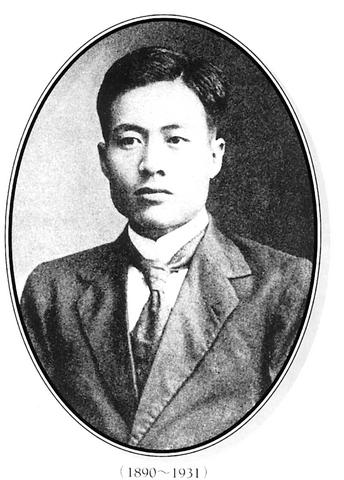Who are the people who established the foundations of Taiwan's modernization at the beginning of the 20th century? Who are the heroes of Taiwan's fight against the Japanese colonial regime? Who are the foreigners who showed more love for this land than many Taiwanese? It is their story that will be told in a TV series titled A Century of Outstanding People in Taiwan (台灣百年人物誌) to air on the Public Television Service (PTS) starting Tuesday.
It took PTS more than two years to produce such a large-scale historical documentary series. It is the first time PTS has chosen to air a documentary series during its prime time 8pm to 9pm, Monday to Friday time slot.
Thirty influential people from the last century are to be featured in the series, with each episode featuring one person's life. The first two episodes feature political movement pioneers Lin Hsien-tang (林獻堂) and Chiang Wei-shui (蔣渭水). In the 1920s, under Japanese rule, the two set up the Taiwan National Council and the Taiwan People's Party respectively, the first political parties to be established in Taiwan. They were the first people who sought to lift the status of Taiwanese during the Japanese occupation period through the creation of democratic political movements.

PHOTO COURTESY OF PTS
Lin also set up the Taiwan Culture Association which brought together Taiwan's cultural and intellectual elite in a forum for the promotion of Taiwanese culture.
Also featured in the series is George Leslie Mackay the first missionary to work in northern Taiwan. His name is still common currency among Taiwanese, associated as it is with the Mackay Memorial Hospitals. Less well known are his contributions to modern education in Taiwan.
For the first time in this type of historical documentary, three Japanese have been included on the honor roll. They include Shimpei Goto, who was the first Japanese governor of Taiwan. It was he who commissioned the first large-scale survey of Taiwan's folk culture. He also established the foundations of Taiwan's modern railway and industry.
Then there is Yoichi Hatta, a Japanese engineer who spent 20 years building the Chiayi-Tainan canal, at the time the largest irrigation project in Asia.
This project transformed the area covered by thecounties of Chiayi and Tainan from barren wilderness to the largest rice provider in Southeast Asia.
Finally there is Kanori Ino, who was the first anthropologist to investigate Taiwan's Aborigines and who wrote the world's first ethnography of Taiwan's Aboriginal people.
A Century of Outstanding People in Taiwan will air on PTS at 8pm on Tuesday.

On April 26, The Lancet published a letter from two doctors at Taichung-based China Medical University Hospital (CMUH) warning that “Taiwan’s Health Care System is on the Brink of Collapse.” The authors said that “Years of policy inaction and mismanagement of resources have led to the National Health Insurance system operating under unsustainable conditions.” The pushback was immediate. Errors in the paper were quickly identified and publicized, to discredit the authors (the hospital apologized). CNA reported that CMUH said the letter described Taiwan in 2021 as having 62 nurses per 10,000 people, when the correct number was 78 nurses per 10,000

As we live longer, our risk of cognitive impairment is increasing. How can we delay the onset of symptoms? Do we have to give up every indulgence or can small changes make a difference? We asked neurologists for tips on how to keep our brains healthy for life. TAKE CARE OF YOUR HEALTH “All of the sensible things that apply to bodily health apply to brain health,” says Suzanne O’Sullivan, a consultant in neurology at the National Hospital for Neurology and Neurosurgery in London, and the author of The Age of Diagnosis. “When you’re 20, you can get away with absolute

May 5 to May 11 What started out as friction between Taiwanese students at Taichung First High School and a Japanese head cook escalated dramatically over the first two weeks of May 1927. It began on April 30 when the cook’s wife knew that lotus starch used in that night’s dinner had rat feces in it, but failed to inform staff until the meal was already prepared. The students believed that her silence was intentional, and filed a complaint. The school’s Japanese administrators sided with the cook’s family, dismissing the students as troublemakers and clamping down on their freedoms — with

As Donald Trump’s executive order in March led to the shuttering of Voice of America (VOA) — the global broadcaster whose roots date back to the fight against Nazi propaganda — he quickly attracted support from figures not used to aligning themselves with any US administration. Trump had ordered the US Agency for Global Media, the federal agency that funds VOA and other groups promoting independent journalism overseas, to be “eliminated to the maximum extent consistent with applicable law.” The decision suddenly halted programming in 49 languages to more than 425 million people. In Moscow, Margarita Simonyan, the hardline editor-in-chief of the